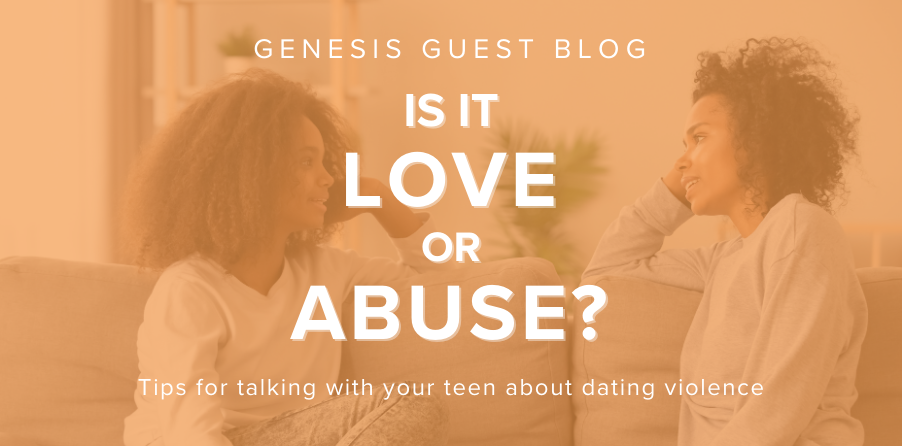The conversation we need to have: Tips for talking with your kids about dating violence.

Entering the realm of teenage years can bring a whirlwind of firsts—first loves, first heartbreaks, and, for many, the first glimpse into the complexities of relationships. Yet, amidst the excitement of navigating these newfound emotions, there is a sobering reality that parents and teens alike must confront: the prevalence of teen dating violence.
It is estimated that 1 in 3 teens will experience some form of abuse by the time they are 20 years old. However, too many teens suffer in silence, afraid to talk about their experiences or unaware that what they are experiencing is not okay. February marks National Teen Dating Violence Awareness and Prevention Month, which gives parents the perfect opportunity to broach the topic of abuse with their children. This can be a difficult conversation, but one we cannot afford to skip, so below are a few tips to help you talk with your kids about teen dating violence.
Embrace the awkwardness
Teen dating violence is not always an easy or comfortable topic to discuss with your child, but the consequences of not having the conversation are far too high. Rather than avoiding or ignoring, I always encourage parents to acknowledge the awkwardness of the topic with their children. Saying something like, “I know this can be awkward to talk about, but I care a lot about your safety and well-being” can help open the conversation. Acknowledging and even talking about the potential awkwardness at the start of the conversations normalizes these feelings for both parent and teen.
Create a Safe and Open Environment
Establishing a space that allows your child to explore this topic without shame and judgment can be a game changer in getting the information to stick. It can be helpful to communicate that the goal of talking about abuse or even unhealthy behaviors in relationships is not to judge your child or to get them in trouble but instead to start talking about an issue that is complicated and confusing (even for adults). Avoid criticizing their choices or blaming them for any experiences they may have had. Rather, focus on offering empathy and understanding. For example, if your child shares problematic behaviors with a significant other, stay away from questions like “why haven’t you ended the relationship already?”. Instead, try validating how confusing it can be when someone who says they care about you does something hurtful. Validation encourages a safe environment where your child does not feel ashamed for their decisions. Likewise, parents might be surprised if their child discloses controlling behaviors. It would be normal to say something like “Why haven’t you told me about this before?” However, questions like this can cause your teen to feel guilty instead of relief. Instead, try “I’m so glad you feel safe telling me about this” to keep the conversation open for future disclosures.
Provide Real-life Examples
When discussing teen dating violence with your child, it is helpful to use examples of abuse tactics or unhealthy behaviors that fit with the experiences kids face nowadays. For example, when talking about emotional abuse, you can discuss how an abusive boyfriend or girlfriend may try and control who their partner follows on social media or text their partner over and over until they finally respond. Teens often find it challenging to spot abuse in their relationships because it is disguised as “love” (i.e., the person just likes me so much). However, using real-life examples that fit the different categories of abuse (physical, emotional, verbal, sexual) can help your child connect to the content in a more relatable way and better equip them to spot unhealthy behaviors in the future. You can even download and print out our Teen Dating Violence brochure that provides multiple examples of the different ways abuse could be present in teen relationships.
Encourage an Ongoing Conversation
Teen dating violence cannot be a one-and-done conversation. Invite your child to bring new issues or experiences to you as they arise and let them know that you plan to talk about abuse and dating violence with them on an ongoing basis. Think about sharing resources with your child to let them learn more. Organizations and campaigns like One Love and Love Is Respect create content geared at young people and understanding abuse. Also, consider using interactions you and your child see in the media or the real world as teaching opportunities. Continuously checking in with your teen about their relationships and experiences helps them feel supported and reinforces that they can turn to you for guidance whenever needed.
The newness and excitement that come with dating and relationships in adolescent years can make it difficult for teens to understand and recognize unhealthy and abusive behaviors by a partner. This only becomes more difficult if no one has taken the time to talk with the teen about the reality of abuse and educate them on the warning signs. By initiating open and honest conversations about dating violence, parents can empower their children to recognize unhealthy behaviors, establish boundaries, and cultivate safe and respectful relationships.
This blog post was written by Genesis Women’s Shelter & Support Counselor Whitney Ball.
